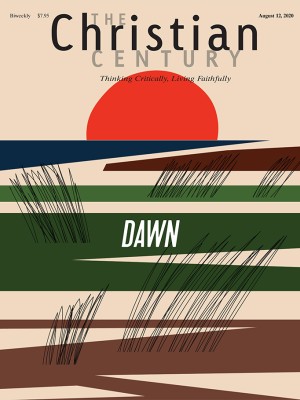August 23, 21A (Exodus 1:8-2:10)
When the privileged and the helpless are called into holy conspiracy
At first, Jochebed hid him. When Shiphrah and Puah, the canny midwives, put the baby boy in her weary arms, what other choice did she have? His very strength was a liability, his very existence a reason for fear. And so his mama held him close. Sheltered him. Whispered his name in his ear, his hidden first Hebrew name that no one else would ever know. Repeated to him, over and over again: you are strong. You are loved. Your life matters.
But in the end, she had no choice but to send him out. All mamas have to give their boys to the wider world someday; they can’t hold on forever. They offer whatever they can to protect them. A basket of papyrus with the cracks sealed tight. A long talk about what to do when stopped by police. The address of an uncle on the other side of the border. The watchful eye of an older sister, thrust into a role of responsibility when she should still be home playing dolls. Mamas try to wrap their love around their sons like a bulletproof vest, and yet the world comes anyway, like a river current, carrying them off into danger.
Read our latest issue or browse back issues.
As the fragile little boat bobbed among the reeds, the Egyptian princess Bithiah took notice. She was a person whose existence had never been hidden, whose voice had never been silenced. She’d always had everything she needed. She carried her power as easily as her servants carried her towels and soap. Jochebed’s beloved baby boy was at the mercy of a person of privilege.
Worse, a woman of privilege. Privileged women are dangerous. Our good intentions stymie meaningful action. Our tears stop dialogue and draw attention back to our hurt feelings, distracting from the matter at hand. Our toxic charity keeps poor people poor. Our emergency calls summon agents of disaster. Our accusations lead to lynching. Our privilege kills.
As a woman of privilege, Bithiah had a choice when she heard the baby’s cries. She could have easily responded out of loyalty to the system that gave her every advantage. She could have called Egyptian 911 to come eliminate this infant threat. Alternatively, she could have responded with paternalistic benevolence, sending the boy to an Egyptian nursery where he’d never know his own people.
But she did neither of those things. Instead, something pushed Bithiah beyond her privilege. The Bible calls it “pity,” but it seems deeper than a surface sympathy. It sounds more like the pity Jesus feels for the leper in Mark 1:41: a gut-wrenching reorientation toward the other. It sounds more like the relentless call of justice: the sense that something about this was just not right and the certainty that she was equipped to change it.
Bithiah could have wielded her privilege like a weapon, as so many women have done before and since. But instead, she applied it as a tool enabling her to serve. With the help of her maids, she lifted the boy out of the water, giving him a new life and a new name: Moses. Then she re-enmeshed him in his own culture and reconnected him with his own family: Miriam as his companion, Jochebed as his nurse. Even more radically, Bithiah found a way to compensate Jochebed for the usually unpaid work of mothering, offering wages for her labor. No one other than a princess could have flaunted Pharaoh’s murderous laws so completely.
The Bible offers only the faintest hint of what happened to Bithiah next. Our scriptures are understandably unconcerned with the stories of powerful people, preferring the scrappy underdogs God favors. We don’t find Bithiah again in Exodus. We don’t know how she reacted when the baby she saved grew up to be an exiled murderer and then a stammering prophet. We have no idea if she ever spoke to her father in the midst of the plagues, leveraging her power on behalf of her adopted son and his family. We don’t know how she felt that night when Moses led the people far away from her river, across the Red Sea.
And yet, deep in the dusty parts of First Chronicles, where they list the long genealogies of the people of Israel, we find this note under the descendants of Judah: “One of Mered’s wives gave birth to Miriam, Shammai, and Ishbah the father of Eshtemoa. . . . These were the children of Pharaoh’s daughter Bithiah, whom Mered had married.”
In the end, it seems, the princess became part of the family, linked not just by adoption but also by marriage. The noblewoman attended by servants became a wilderness refugee, wandering with her new clan for 40 years in the shadow of Sinai. She gave birth to her own vulnerable children and named her daughter after that brave girl at the riverside. Bithiah became Jesus’ great-great-auntie, an unlikely ancestor winking from his family tree.
Jochebed’s children still make their perilous journeys today, armed with little but their mama’s fierce love. And Bithiahs aplenty sunbathe by the riverside, capable of casual cruelty but also—at our best—able to subvert the very systems that sustain us. God calls us into holy conspiracy and invites us into one tangled family, for the sake of the most vulnerable. For God’s own sake.






